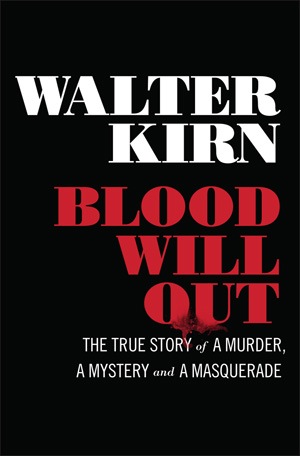Book Review: A Murder Inspired by Literature? — “Blood Will Out”
Everyone these days is racing through “Blood Will Out,” an undeniably enthralling three-hour read.
Blood Will Out-The True Story of a Murder, A Mystery, and a Masquerade, by Walter Kirn. Liverwright, 272 pages, $25.95.
By Gerald Peary
Would you have fallen prey, as so many did, to the obsessive lies of the man—and the convicted murderer — who called himself Clark Rockefeller? (His real name: Christian Gerhartstreiter, grown up in Germany.) Here are some of Rockefeller’s typical whoppers. That when he resided in Wyoming, Dick Cheney tried to marry him off to one of Cheney’s daughters. That he knew George Lucas and, when he lived in Cornish, New Hampshire, J.D. Salinger was one of his good friends. That he started Yale at age 14. That he had a private key allowing him night access to the Rockefeller Center. That on the back of a painting on his wall were splatters of Mark Rothko’s suicide blood.
That he hailed from Pasadena, California, son of a failed actress. That he came from England, disguised British royalty. That he was developing propulsion systems for spacecraft, backed by a Defense Department contract. That he was a “freelance central banker,” whose chief client was the country of Thailand. That he was Christopher Chichester, a baronet. Most often, that he was a Rockefeller, perhaps a bit of a black sheep, but deep pocketed with family money.
Oh, and that he was innocent of the 1985 Southern California killing of John Sohus, his landlady’s son, for which, in 2009, he was sentenced to life without parole. That when the homicide took place, he was on the road in Northern California selling tea.
“Britney Spears was out last week,” he once told novelist Walter Kirn, author of a new book about him, Blood Will Out-The True Story of a Murder, A Mystery, and a Masquerade. “You missed her. And it’s a shame you can’t stay longer. Chancellor Kohl is driving up.”
Everyone these days is racing through Blood Will Out, an undeniably enthralling three-hour read. Hollywood has been pitched this “unlikely friendship” tale featuring a modern-day reworking of Nick Carraway (Kirn) and Jay Gatsby (Rockefeller), plus, an extra lure for the screen, that this Gatsby underneath is Hannibal Lecter.
Curiously, it’s hard to come up with a Rockefeller fib which matches the totally incongruous way that, in 1998, Kirn and he first met up. To impress his wife with his caring nature, Kirn volunteered to transport a badly crippled dog from Montana to New York City, by truck and plane, so that the dog’s new owner could adopt Shelby and rehabilitate it. Kirn was met at LaGuardia by the ostensible canine lover: Rockefeller, in a Ivy Leagueish pink polo shirt and no socks, and by Rockefeller’s nervous, recessive wife, Sandra. The beginning of a peculiar friendship.
Over the years, they would meet at fancy restaurants and in exclusive clubs, where Rockefeller would non-stop talk at Kirn, offering up his paranoid theories of world conspiracies and name-dropping the wealthy and famous. He rarely asked Kirn anything. At the end of the lavish meals, Rockefeller would, inevitably, have left his wallet at home, sticking Kirn with the check. “I’d bowed to a tinfoil prince. I’d kissed his ring,” Kirn confessed later, when he finally grasped the obvious, that his perennial dinner date was a devious confidence man.
Often in the book, Kirn attempts to comprehend why he bonded so eagerly with Rockefeller, and why he never challenged those preposterous stories. His easiest answer is that Rockefeller was extremely entertaining company, including the fabulist things he said. But there’s more. Kirn was a kid from Minnesota who ended up at Princeton and then at Oxford. An outsider, he yearned for recognition from the refined elite who populated both universities. It was Rockefeller who ultimately supplied it, the engagingly snobby faux patrician who deemed Kirn at one point “my best friend.”
Not quite so convincing, Kirn works to build a case that Rockefeller was some sort of vague doppelganger. Kirn claims he was a major liar at one point in his life, making up elaborate biographical stories to impress girls. Arriving at Princeton, he was, like Rockefeller, a person without a center, who invented identities to maneuver his way. At a much later time, both Kirn and Rockefeller were badly bruised by divorces, and both had children from the failed marriages. But these analogies can only go so far. Kirn didn’t kidnap his daughter, as Rockefeller did. Kirn might be a bit scummy (he doesn’t paint the most complimentary picture of himself), but, unlike Rockefeller, he didn’t assassinate anybody, cut his victim in pieces, and bury the severed body in his back yard.

Christian Gerhartstreiter — Would you have fallen prey, as so many did, to the obsessive lies of the man—and the convicted murderer — who called himself Clark Rockefeller?
Is Kirn, the novelist, projecting when he feels that Rockefeller consciously committed “a literary murder”? He knew for sure that Rockefeller had read Crime and Punishment multiple times. He knew that, like Raskolnikov, Rockefeller felt that people were stupid, and that he was arrogantly above the law. Kirn surmised: as an intellectual exercise, Rockefeller smashed in the skull of John Sohus, who was an arbitrary victim like the teenager murdered in the 1920s by Leopold and Loeb. (Rockefeller probably also killed Sohus’s wife, Linda Sohus, though a body has never been located.)
Besides The Great Gatsby, Kirn located inspirations closer to home than Dostoevsky for whom Rockefeller chose to be, and for what he’d done. Most obviously, the Ripley novels of Patricia Highsmith, though Rockefeller claimed to have never read them. Well, what about the films of Alfred Hitchcock? Perhaps Rockefeller’s chilliest moment: he orchestrated an evening amusement of Trivial Pursuit, playing the game in the same back yard where Sohus’s sliced-up body was buried. Kirn notes the similarity to Hitchcock’s Rope, where the two killers have a party in the very room where their murder victim, just hours dead, lies in a hidden coffin. But it’s Strangers on a Train, from Highsmith’s book, which is the key text. For Kirn, there was nobody closer in resemblance to Rockefeller than Robert Walker playing Bruno: the same voice, the same perhaps-gay demeanor. The same excitement over murder? He doesn’t say the obvious, that Kirn is surely Farley Granger’s Guy, being sucked into Bruno’s lair, seduced by Bruno shallow compliments.
Interviewing Rockefeller in prison, Kirn asked him, at last, why clever people fell for his untruths. “Vanity, vanity, vanity,” was Rockefeller’s straightforward reply.
Gerald Peary is a professor at Suffolk University, Boston, curator of the Boston University Cinematheque, and the general editor of the “Conversations with Filmmakers” series from the University Press of Mississippi. A critic for the late Boston Phoenix, he is the author of 9 books on cinema, writer-director of the documentary For the Love of Movies: the Story of American Film Criticism, and a featured actor in the 2013 independent narrative Computer Chess.
Tagged: Blood Will Out, Christian Gerhartstreiter, Clark Rockefeller

